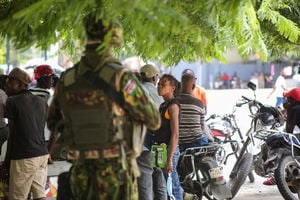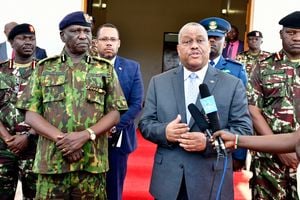
A police vehicle is seen on patrol as people flee their homes from gang violence, in Port-au-Prince, Haiti, October 26, 2024.
Just days after residents of Port-Sonde in Haiti returned to their homes following a deadly attack that left over 70 people dead, gangs are now targeting various towns in the Caribbean nation.
Last week, gang members based in Viv Ansanm destroyed a newly built police station in Cabaret which has been under the command of Haiti National Police (HNP) officers.
The attackers were dressed in clothes that had been branded Unite Village de Dieu (UVD). The gangs stormed the station 24 hours after a Kenyan-led Multinational Security Support (MSS) Mission alongside the HNP officers took over Cabaret Town.
“The gangs are still controlling a number of towns within Haiti, however, I am aware that residents of Port-Sonde which was recently attacked leaving over 70 dead, are now going back to their homes,” said Mr Wethzer Piercin.
Gang attacks
Other towns that are still unstable due to the ongoing gang attacks include; Solino and Arcahaie. In the two towns, several people have fled their homes.
However, this week, MSS Mission commander Geoffrey Otunge said that residents of Port-Sonde should not be worried as they had secured the place.
“People living in Port-Sonde should go on with their normal lives as we have been able to secure the whole place,” said Mr Otunge.
This is despite the locals raising concerns over frequent threats.
On October 4, 2024, at least 70 people were killed when armed men belonging to the Gran Grif gang attacked Port-Sonde which is located in the Central part of Haiti.
During the attack, two gang members were seriously injured.
A total of 45 homes and over 30 motor vehicles were also set ablaze by the gang members leading to the fleeing of thousands of locals.
Haitian Prime Minister Garry Conille condemned the attack saying that it was unnecessary as it targeted innocent women and children.
“To those who sow terror will not break our resolve. You will not subdue these people who have always fought for their dignity and freedom. We will never give up our right to live in peace,” said Mr Conille.
The Gran Grif gang is led by one Luckson Elan, who accused the police of killing members of his gang after the attack.
Known for its rice production, Port-Sonde is also known as a base controlled by the Gran Grif gang. Currently, Luckson Elan, the leader of the gang, remains a wanted man.
They have also erected logs bearing human skulls to send a message that Pont Sonde is a no-go zone.
On Friday, however, officers were able to enter the area and arrest several Gran Griff gang members, who are being interrogated.
“For the officers to gain access to the gang’s hideout at Carrefour Paye intersection on the road that leads to the home of Elan Luckson, the officers had to fill up the trenches with sand,” said an officer who was part of the operation.
According to the MSS team, the officers ended the operation at the Pat Chwal area in Haiti where they recovered several weapons.
This comes at a time when Kenya is planning to deploy an additional 600 officers to the mission.
President William Ruto in early October said that Kenya will be sending an additional 600 officers in November to Haiti. Already, there are 400 Kenyan police officers in the Caribbean nation.
The MSS mission is currently in its second stage which is the decisive/operation stage that has seen Haiti police together with Kenyan police officers, actively engaging in operations to flush out gangs from Port-au-Prince beginning in June this year.
Although the mission has reached the second phase, there are still problems with the first phase, the deployment stage, which was supposed to bring in security officers from Kenya, Jamaica, the Bahamas, Antigua and Barbuda, Bangladesh, Benin, Chad, and Guinea.
These concerns were echoed by President Ruto who while addressing the media alongside Haiti's Prime Minister Garry Conille said that countries should keep their word and deliver what they have promised as Kenya is doing.
This delay by the other troop-contributing countries has largely been seen as a tactful delay, as the countries await the results of the US elections before deploying their officers.
The US is the largest financier of the MSS mission in Haiti.
The third phase of the mission is the stabilisation phase, where the mission will focus on strengthening Haiti's public institutions, such as hospitals, schools, the judiciary, and security agencies.
The final phase - the transition phase - will take place after the United Nations Security Council and the MSS team have analysed the situation and determined that Haiti is on the right track to sustain its governance structures and peace.
At that point, the MSS mission will end and the government of Haiti will be left with the unique role of maintaining law and order on its territory as the troops withdraw.
Meanwhile, the area around the Toussaint Louverture International Airport has been secured after police demolished buildings from which gangs have been operating.
The airport is located in Tabarre, a commune of Port-au-Prince, the capital of Haiti. In the northern part of the airport, there are many incomplete structures from which the gang members have been operating.
The airport is among the areas that were captured by the gangs in March, forcing the immediate former Prime Minister of Haiti Ariel Henry to fear returning to his home country from Kenya where he held talks with President Ruto on sending officers to the Caribbean nation.
“There are ongoing demolitions targeting several buildings around the airport. The buildings have been home to armed gang members who used to carry out attacks to stop operations in the main international airport in Haiti,” said Mr Otunge.
Mr Otunge said that since the airport was the main entrance to foreigners and is also used in bringing in some of the equipment they need during the mission scheduled to end in October 2025, then there was a need to ensure that it was secure.
The gangs took control of the buildings after they forcefully kicked out the owners to control what came into the country through the airport.
Compared to early this year and previous years, the number of international and local flights in the gang-infested country has increased in the recent past.
So far three countries have sent their officers to Haiti. They are Kenya, Jamaica and the Bahamas.










